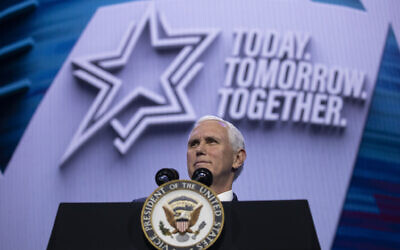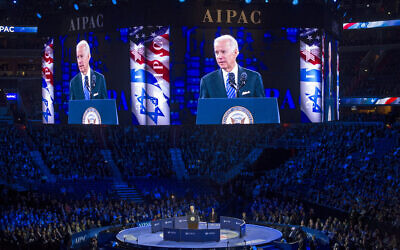AIPAC Sees New Threat to U.S.-Israel Ties
In the space of AIPAC's three-day conference, there were major developments in both American and Israeli politics.
Dave Schechter is a veteran journalist whose career includes writing and producing reports from Israel and elsewhere in the Middle East.
While the speeches at AIPAC’s annual policy conference garnered headlines, the primary mission of the American Israel Public Affairs Committee was carried on away from the Washington, D.C., convention center.While the speeches at AIPAC’s annual policy conference garnered headlines, the primary mission of the American Israel Public Affairs Committee was carried on away from the Washington, D.C., convention center.
Preserving bipartisan support for Israel is AIPAC’s prime directive and, inside the hall, politicians from across the American political divide spoke of the need to defend that relationship and not allow Israel to be “weaponized” as a political issue.
Meanwhile, thousands among the 18,000 people attending the March 1-3 conference, including some 4,000 college students, marched up Capitol Hill to lobby members of the House and Senate about why bolstering U.S.-Israel ties merits their support.
AIPAC CEO Howard Kohr opened the conference by warning of “an emerging threat to America’s friendship with Israel. … A growing, highly vocal, and energized part of the electorate fundamentally rejects the value of the U.S.-Israel alliance.”

In this election year, it was not difficult to determine that Kohr was referring to, among others, Vermont Sen. Bernie Sanders, who, at the time, was the presumptive front-runner for the Democrats’ presidential nomination.
Sanders, who is Jewish, drew fire from AIPAC supporters for saying that he would not attend the AIPAC conference because the organization provides a platform “for leaders who express bigotry and oppose basic Palestinian rights.”

The conference opened the day after former Vice President Joe Biden won a decisive victory in South Carolina’s Democratic presidential primary and ended hours before Super Tuesday vote totals put Biden ahead of Sanders in the contest for delegates to the party’s nominating convention this July in Milwaukee.
In that interval, Minnesota Sen. Amy Klobuchar delivered an address via video and the next day suspended her campaign and Mayor Pete Buttigieg of South Bend, Ind., suspended his campaign before his recorded address was shown. Both then endorsed Biden.
In addition to the self-avowed Democratic Socialist Sanders, Massachusetts Sen. Elizabeth Warren also did not participate in the AIPAC conference.
Biden delivered his remarks via video, while former New York City Mayor Mike Bloomberg, who is also Jewish, was the lone Democrat left on the party’s debate stage

to show up in the flesh.
On March 4, the day after Super Tuesday, Bloomberg suspended his campaign and, like Klobuchar and Buttigieg before him, backed Biden.
In recorded remarks played March 1, Biden told the AIPAC conference that he would “always stand with and for a secure, democratic Jewish state of Israel,” but also cautioned Israel against annexing West Bank territory that would prevent creation of a contiguous Palestinian state.
“That’s going to choke off any hope for peace. And to be frank, those moves are taking Israel further from its democratic values, undermining support for Israel in the United States, especially among young people in both political parties,” he said.
“That’s dangerous,” Biden added. “We can’t let that happen. We can’t let Israel become another issue that divides Republicans and Democrats. We can’t let anything undermine the partnership.”
Bloomberg told the AIPAC audience March 2 that “strong supporters” of Israel “don’t need to agree with everything an Israeli government does. I certainly don’t. And as proud patriots of America, we do not need to support everything our government does either. Again, I definitely don’t. Differences of opinion are healthy, even on big issues.”

Bloomberg did throw some shade in the direction of President Donald Trump.
Anti-Semitism “can be found both on the right and the left,” Bloomberg said, “but there is one fact that we cannot ignore: Presidential leadership matters. It sets a tone. It is either inclusive or exclusive, divisive or uniting, incendiary or calming.”
Trump has not appeared at the AIPAC conference since 2016, when his criticism of a sitting president, Barack Obama, was rebuked by AIPAC’s leadership, as it strived to maintain bipartisanship. [Note: Trump is scheduled to speak March 14 to the Republican Jewish Coalition meeting in Las Vegas.]
The administration’s chief representatives at AIPAC were Vice President Mike Pence and Secretary of State Mike Pompeo.
“The most pro-Israel president in history must not be replaced by one who would be the most anti-Israel president in the history of this nation,” Pence said, referring to Sanders, who may or may become the Democrats’ nominee for the November election. “That’s why you need four more years of President Trump in the White House.”
While not referring to Sanders by name, Pence said, “One of the leading candidates openly and repeatedly attacks Israel as a racist state.”
Sanders has called Israeli Prime Minister Benjamin Netanyahu a “reactionary racist,” but has not said that Israel is a racist state. Sanders has expressed support for the “two state solution” that would create a Palestinian nation, while denouncing the building of housing settlements in the West Bank, which many Israelis refer to by the biblical names of Judea and Samaria.
According to its website, AIPAC’s position is: “A durable Israeli-Palestinian peace can best be achieved through direct negotiations between the two parties, resulting in a Jewish state living side-by-side in peace with a demilitarized Palestinian state.”
The No. 2 Democrat in the House of Representatives, Steny Hoyer of Maryland, told the conference, “To be frank, however, there has been a lot of heated talk lately about Democrats, and from some Democrats with regard to Israel. I have spent the past 50 years supporting the U.S.-Israel relationship. Let me make it clear: as a party, Democrats in the House stand solidly with Israel and the right of every Israeli to live in peace and security.”
As it happened, Israel’s third attempt in a year to elect a Knesset, and thereby a prime minister, came on March 2, in the middle of the AIPAC conference.
[Note: Based on results reported March 5 by Israel’s Central Election Commission, a potential bloc formed by Netanyahu’s Likud party and other right-wing parties would fall two or three short of a 61-seat majority in the 120-seat parliament, while the center-left opposition Blue and White and its center-left allies would have a lesser number.]
Netanyahu and Benny Gantz, leader of the Blue and White party, both addressed the conference via video.
Netanyahu did not name Sanders but said that accusations of “bigotry” were “outrageous.”
“You send a powerful message to all those who seek to weaken our great alliance that they will fail,” Israel’s longest-serving prime minister told the AIPAC conference.




comments